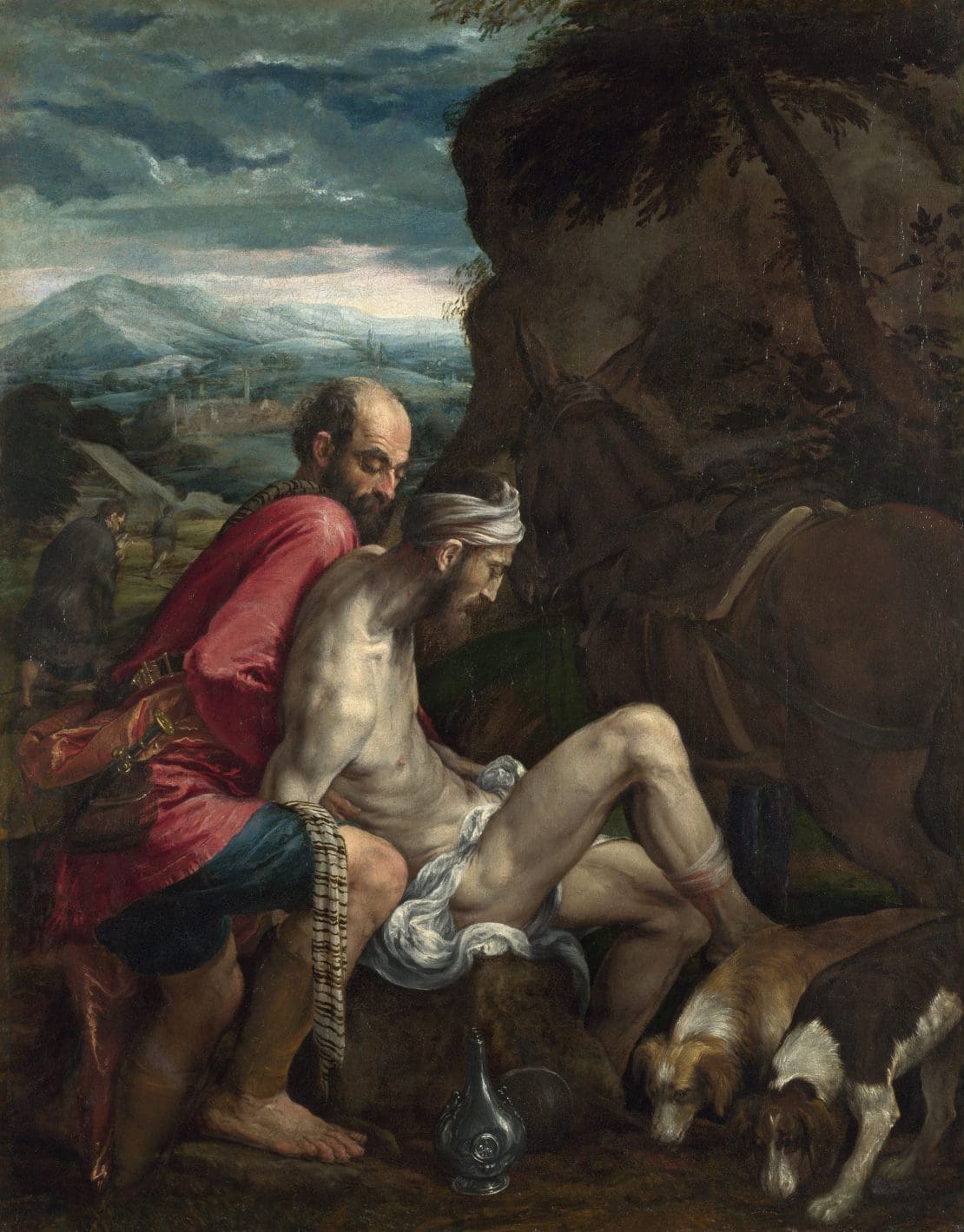To Love the Undeserving is to Love as God Loves
As noted previously, man is a body-soul composite that is made for interpersonal communion with both God and neighbor. He was created by God and late rejected the fullness of God’s relationship in favor of determining his own happiness. This is what we call original sin and the effects of original sin are a disordering of our internal faculties (link) that results in a tensional struggle between reason and desire. Though there is tension between reason and our desires it does not mean that one of them is evil and the other good, indeed, both are good when ordered properly to our final end — eternal life — and also our earthly ends — the universal call to holiness, my present particular vocation, and my avocation or job.
The order that God has established in creation to manifest Himself and His will to man is what refer to as natural law. When we disorder His creation we recognize that we ought to attempt to reorder it in restitution for our actions. Think of the child who knows it has done wrong and poorly attempts to ‘fix’ or cover its error. It is of course impossible for us to undo a past action since man lives exclusively in the present — ever-fleeting — moment. Beyond his commitment to avoid past sinful actions and suffering or forethought of how to avoid sin and suffering in the future, man is concerned with the present.
When we are confronted with human suffering and disorder — especially in a loved one — it is out of love that we seek to ‘fix the problem which is causing the suffering and disorder. The only aspect of creation that we have control over is our own free acts in a given present moment — that is it. We cannot force another person to do something no matter how much they owe us, how much we love them, how right we are, or how much they wish to please us. In the end, the individual person is required to will himself or herself to do the action. Of course, there are situations that lessen or increase the person’s responsibility for an action. Was their life threatened? Have they been conditioned to respond in a particular way? By sin? By another’s prompting? Is it is avoidance of traumatic or threatening memories or situations? However, the person is still making a free choice along the way, even if their ability to reason freely has been lessened or weakened by habit or trauma.
So what is the loving and truthful response to this suffering and disorder? Our response must be a genuine interpersonal relationship for the love of the person as a good in themselves and in the love of God.
1 John 4 spoke about this last week in the mass readings when John implied that is through our love of neighbor that our love of God is perfected. By loving our neighbor and abiding with him, the Trinity increases its dwelling within us and our living for God exclusively increases — the perfection of charity. St. Catherine of Siena clarifies in her Dialogues in number 64. Jesus tells her that the perfection of charity requires loving those who do not deserve it. Since man owes more than he could ever offer to God, man cannot love God in the way that God loves man. What does it mean then to “be perfect as your heavenly Father is perfect?” (Mt 5: 47-48)
It requires us to love as the Good Samaritan loved. We must love as a family member, our own children, our God, those placed in our lives who are undeserving of our love (Mt 25:31-47). Those who hate us, those who persecute us, those who would spit in our face, are to be loved as we would love our father, mother, sister, or brother. The Blessed Mother was because she loved God above all things and her neighbor — those who crucified her son — as her own child, their God, and Savoir.
Our response then should be to love the person before us who is experiencing suffering and disorder in a way that manifests the unconditional always faithful love of our God. We should be ready to sacrifice everything, as God sacrificed everything for us, to help them develop communion with God.
A God that has called each one of us back a myriad of times from our own suffering and disorder. A God who can take our experiences of sin — allowed by His permissive will, but not directed by his will — and use them as a tool to lead ourselves and others to salvation.
It seems the only fix to the problem of suffering and disorder in anyone’s life is to fully enter into their suffering and disorder and through loving encouragement and compassionate expression of the truth, to show them the face and heart of God. It is this radical call to love that we often forget when we wish that we could fix something about someone. Only God can fix someone and He does it through His infinite and eternal outpouring of gratuitous undeserved love. He does not force a person to do as He desires against their will, rather He inspires them to do as He asks by His radical, unconditional, always faithful, and sacrificial love for the individual. How often do we love in this way when we are confronted with a problem that we need to fix? Have we ever loved and sacrificed so much as to inspire another person to freely choose to do what we want? These are important questions, not for the purpose of manipulating others, but in gauging our adherence to the will of God. If we are to love as God loves, then we ought to examine more closely how well — or poorly — we love those who are undeserving of our love.



(2) Comments
Josee
I am wondering about this myself. Last week Bishop Barron had a commentary on the Gospel for Pentecost and in it he spoke of St Thomas Aquinas defining love as willing the good of the other as other. In looking at my loved son, I ask myself “How well do I love him as other?”. While same sex attraction is an easy target to identify, how well do I will the good of the other with whatever “otherness” they bring. This is the challenge. This is the radical mission. God bless you.
Randy
I am struck, again, by the conclusion that the implicit message of this piece is rooted in the realm of “those who are undeserving of our love”. I was taught in my Catholic elementary school that not one of us is ‘deserving’ of God’s love. Absolutely, positively not a single one of us. I was taught that whatever ‘good’ we’ve accomplished in this life is a direct function of God working through, sometimes without our full, and undivided cooperation. I was taught that what ever assets and other blessings we have acquired, accrued, amassed, and accumulated throughout our lives are, indeed, Blessings from God, as the Book of Job makes crystal clear.
How, then, do we have any type of Catholic discussion about ‘loving the undeserving’, when, at least in my understanding, no one of us is completely deserving in any absolute sense. In a relativistic way, I suppose, some may on the surface, appear more deserving than others. But, on the other hand, we witness within the Church, relativism being sullied all of the time. An absolute truth of which I had been made highly cognizant as a boy was that ‘no one of us DESERVES heaven’. If this is true, then how do begin to consider the ‘underserving’.
It has become increasingly evident to me without a doubt, that embracing SSA and gender discordance has become a systematic scapegoat within the Church. I am saying nothing about the sinfulness of engaging in behavior or entering into relationships which allow for full expression of these conditions. To actively and intentionally embrace these conditions and act out are sinful. This is clear. Nonetheless, when we become so inflated that we begin to talk about the “undeserving”, now we’ve crossed treacherously into “judge not” territory.
This country has embraced heirarchy, and a caste system since the very beginning. Heirarchy is required to organize ideals, constraints and behavior of the masses. When heirarchy becomes a coveted means by which to ensure the wealth, well-being, self-actualization, and acclaim of some at the expense of many others, then scapegoats are needed to maintain the imbalance, and to ensure the durability of favored status.
I’m a sinner. I am a SSA man, married to a great woman. I’ve acted sinfully repeatedly. Still, it is very difficult to bear the weight of thinnly veiled indignance from so many clergy, in so many places I’ve been, in searing light of their very own blindness and denial.
The Body of Christ WILL heal when every organ of the Body, heals.